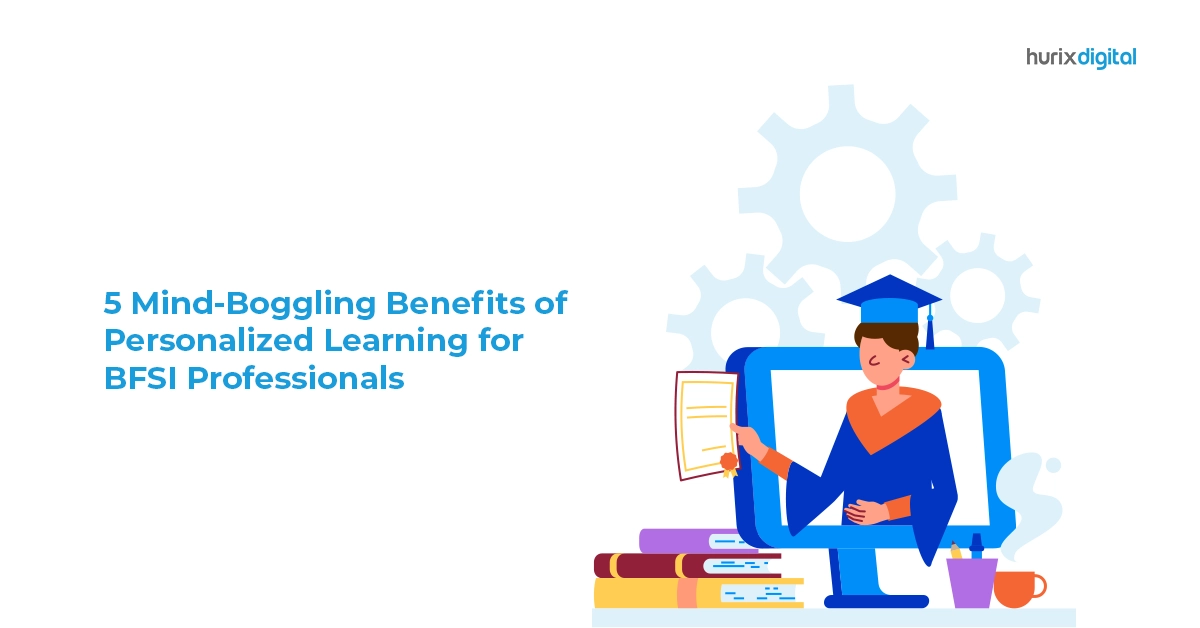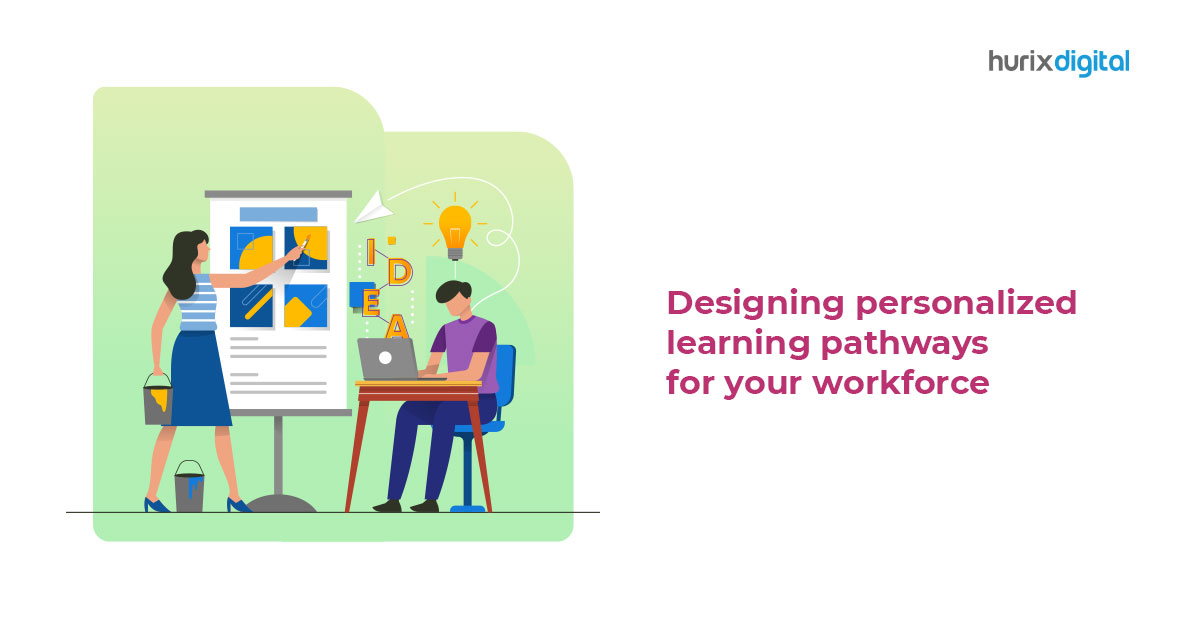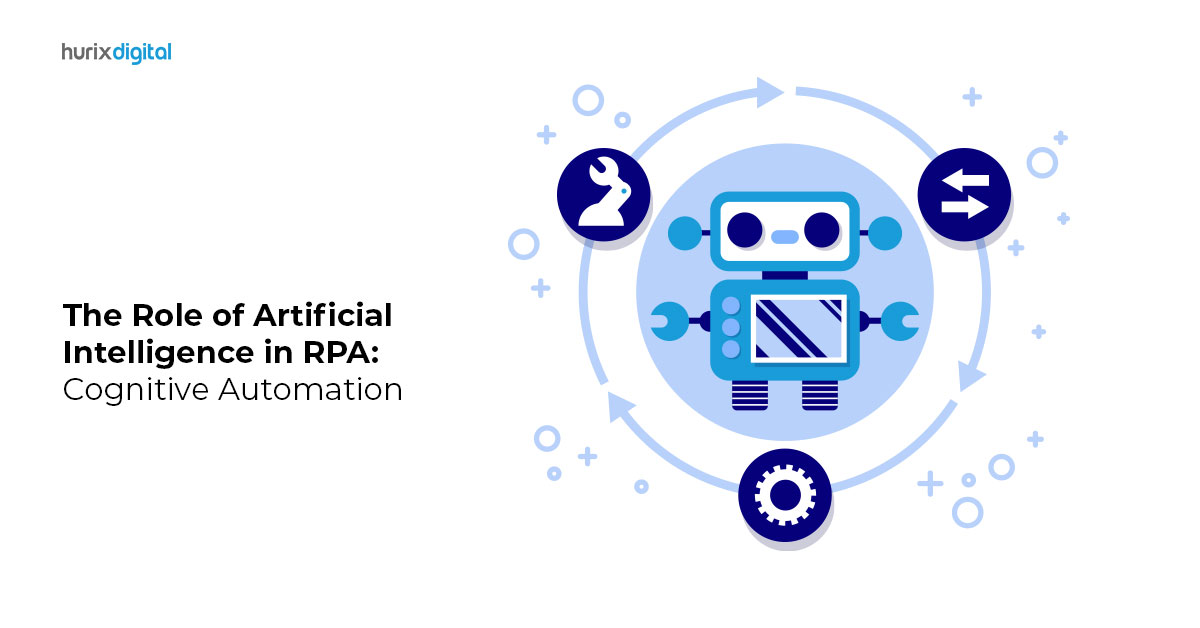
K5 Students – Bringing AI to the Classroom to Make Fun, Engaging, and Effective
Artificial Intelligence (AI) isn’t just the future. It’s a current reality which is going to get bigger and better. The generative AI in the gaming market is estimated to grow from $922 million in 2022 to $7,105 million by 2032 at a compound annual growth rate (CAGR) of 23.3%. These numbers highlight that AI games for K5 student learners are the future wave in education.
In today’s rapidly evolving world of technology, preparing young minds for the future is imperative. Did you know that AI could contribute up to $15.7 trillion to the global economy by 2030?
This means our students will enter an increasingly AI-driven workforce. Integrating AI in curriculum planning is crucial to equip students with the 21st-century skills necessary to thrive in the digital age.
In this article, you’ll learn about the importance of AI in curriculum design and what to teach in an AI curriculum for K5 students.
Table of Contents:
- What is Artificial Intelligence for K5 Students?
- The Role of AI in Assessments
- Importance of AI in Curriculum Development for K5 Students
- Enhancing K5 Education with AI Games
- 5 Ways Effective AI Assessment Techniques Help K5 Educators
- How Can AI Help Explore Innovative Teaching Methodologies?
- Top 5 AI-Powered Educational Games Your K5 Students
- Wrapping Up
What is Artificial Intelligence for K5 Students?
Artificial intelligence is the art of teaching computers how to make decisions. AI education helps students learn how to train computers through programming and testing.
Students can design art, program games, and even robots. Through this progressive learning method, students can become the creators of their realities.
The Role of AI in Assessments
Assessments are a key part of a learning program, from motivating students to helping educators improve their teaching methods. AI has proved its efficacy in lesson enhancement and delivery, and it now fulfills the roles of accuracy and speed in assessments.
With digital learning, the size and scale of classrooms have expanded, increasing the workload on teachers. Having to grade hundreds of assessments in a few days while maintaining the quality of assessment and grading is no easy task. This is precisely where AI-backed technologies can help teachers keep things running seamlessly.
There are several AI assessment techniques that teachers can leverage for better outcomes.
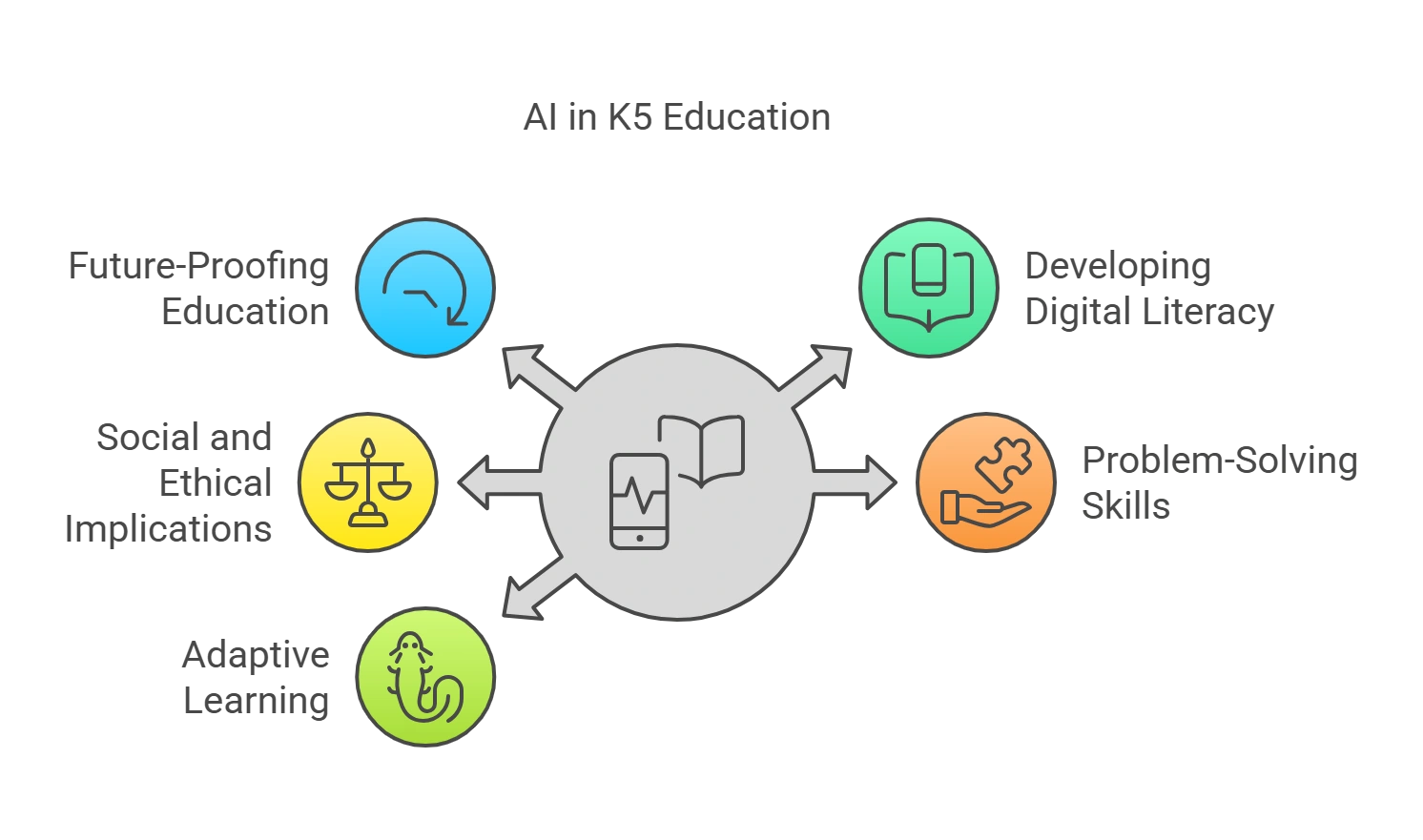
Importance of AI in Curriculum Development for K5 Students
AI education introduces school students to the fundamentals of robotics and AI. It allows students to reflect on their thinking, encourages students to solve complex problems, analyze data, and make informed decisions, and nurtures their critical thinking abilities.
Let’s look at some other reasons why teaching AI to K5 students is essential.
1. Future-Proofing Education
Just like numerous technological breakthroughs in history, the increasing adoption of AI will lead to the creation of new disciplines and jobs.
Introducing AI tools, concepts, and applications early can better prepare students for the future job landscape. It will give them a foundational understanding of AI, which can be valuable for their careers.
2. Developing Digital Literacy
AI literacy is critical today, where algorithms drive online communication, content recommendations, and digital problem-solving. Integrating AI education into schools helps students develop essential digital literacy skills.
Just as students learn to read and write, understanding AI is emerging as a vital component of modern literacy.
3. Social and Ethical Implications
The rapid progress of AI technology has raised several social and ethical questions. Teaching AI to K5 students can instill values such as bias mitigation, fairness, and privacy from an early age.
Students also learn to assess the ethical implications of AI technologies, guaranteeing ethical and diligent utilization in their future pursuits. This will empower them to be considerate and responsible AI creators and users.
4. Problem-Solving Skills
AI education helps foster critical thinking and problem-solving skills in K5 students. It teaches students to break down complex problems, identify patterns, and create algorithms.
These skills are valuable not only for AI but also for a wide range of challenges in life. Ignoring AI is akin to disregarding social media just a decade ago or neglecting the internet in the late 20th century.
5. Adaptive Learning
AI can personalize education by assessing each student’s learning pace and style, thus making learning more engaging and effective. Students can better appreciate and adapt to AI-driven educational tools by understanding AI.
Furthermore, early exposure to AI can help bridge the diversity and gender gap in the tech industry. Encouraging all students to explore AI-related subjects can lead to a more inclusive tech workforce in the future.
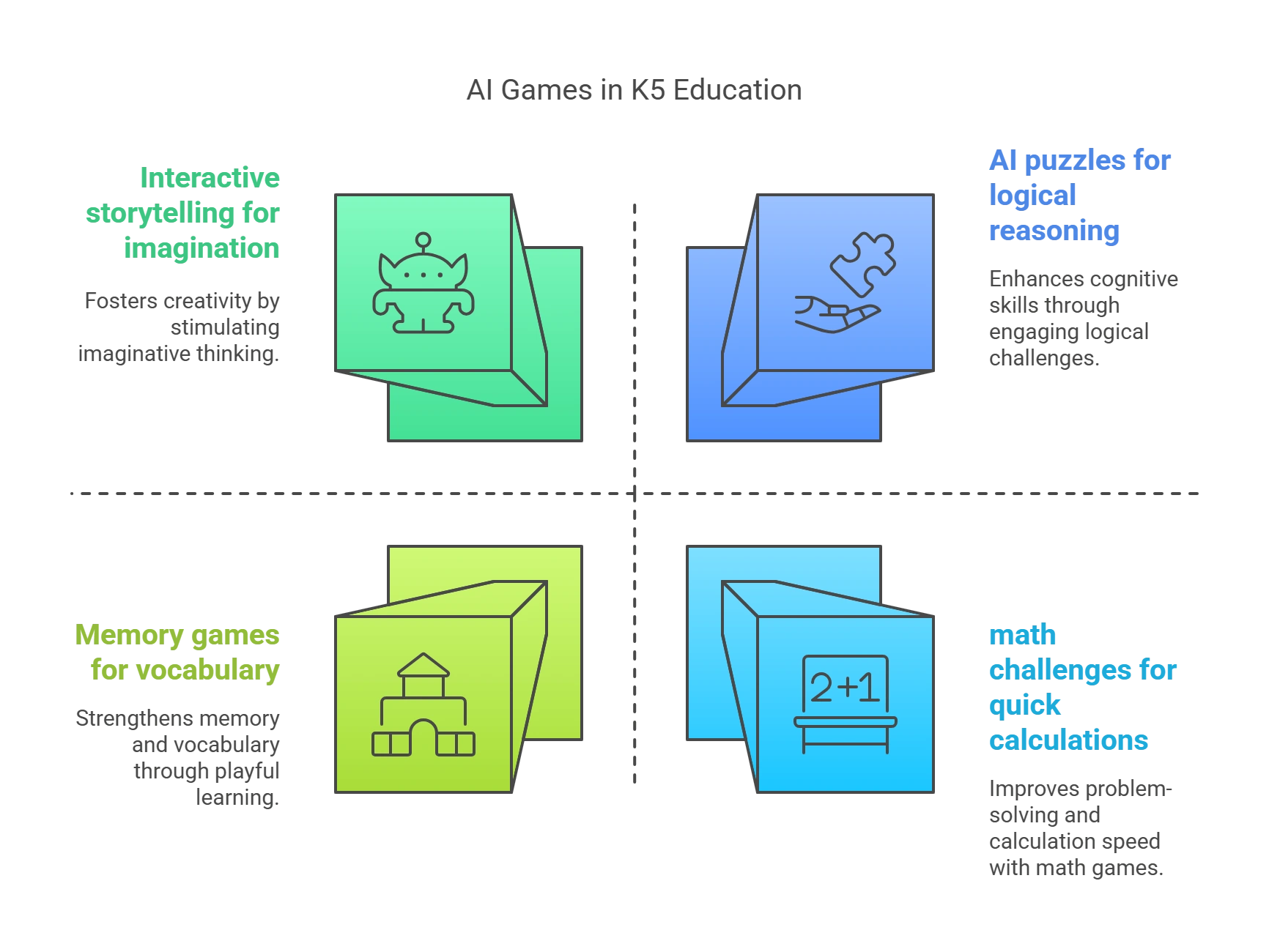
Enhancing K5 Education with AI Games
The brilliance of AI-infused games for kids is that they turn learning into a captivating adventure. They help K5 students practice skills, learn new concepts, and enjoyably engage with subjects like language and math.
What’s more, AI games adapt to a child’s level of understanding, creating personalized and immersive learning experiences.
Here’s how they can transform screen time into an enriching experience:
1. Boosting Critical Thinking and Creativity
AI education tools for K5 learning offer exciting game worlds where students can play, explore, and express their creativity.
When students interact with the game environment, they are encouraged to make logical decisions and think outside the box. They begin identifying different solutions and possibilities, fostering innovative thinking.
2. Improving Problem-Solving Skills
AI-powered educational games often pose challenges that students must resolve to progress. When students engage in these tasks, they learn to identify problems, observe patterns, and develop solutions, enhancing their problem-solving abilities. These are all critical skills in today’s digital era.
The best part is that AI games adapt the difficulty level based on the student’s performance. They also provide real-time feedback, aiding both enjoyment and learning in equal measure.
3. Enhancing Memory Retention and Cognitive Abilities
AI games can be designed to improve concentration or test memory retention. As students navigate different AI-powered K5 learning activities with diverse challenges or levels, their cognitive abilities, including memory, attention, and processing speed, receive a beneficial workout.
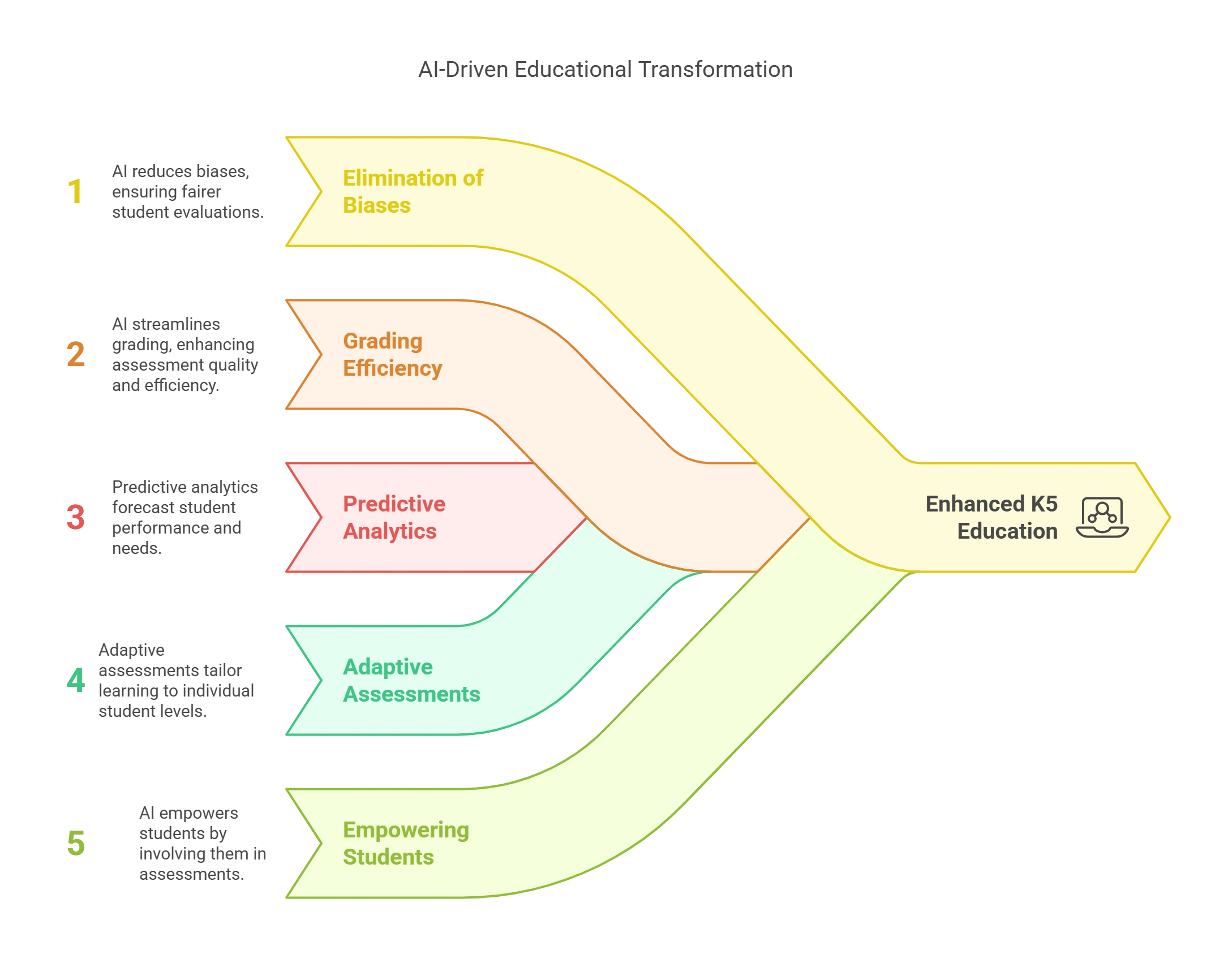
5 Ways Effective AI Assessment Techniques Help K5 Educators
While AI is helping the education sector improve its pedagogical approaches and transform for the better, it also strongly impacts how teachers conduct assessments. There are several AI assessment techniques that K-5 education can leverage to ensure that the feedback is as high in quality as the lesson delivered.
1. Elimination of Biases
No matter how pragmatic a teacher is, biases can cloud their judgment while grading K-5 students’ tests. Being in the elementary grade, there is a strong impression of everything a teacher does and says to the students. When biases enter an assessment, the learning curve for some may become steeper.
AI-based assessments can help remove teacher biases, delivering more objective feedback to the parents/guardians. This feedback is a true reflection of the student’s performance, not considering any aspects of a student outside of the scope of the assessment.
2. Reduction in Grading, Improvement in Assessment Quality
Since the size of classrooms has increased, so has the workload on teachers. In K-5, it is extremely important to thoroughly grade each assessment with equal care and attention to ensure the students’ foundational learning is sound.
However, the consistency is bound to drop with each test graded because teachers can experience burnout. Leveraging AI assessment techniques, it is possible to maintain the quality and consistency of test grading and enhance the speed of grading. The best part is that computers do not get tired and do not make compromises. Therefore, whether it is 100 tests or 1,000, the assessments will always be graded with the same standards.
Plus, it can deliver instant feedback, helping students resolve their queries sooner and acquire resources for supplemental learning.
3. Predictive Analytics
AI analytics in K-5 education can help teachers identify at-risk students early through assessments. The smart algorithms can collate a variety of student data to present a complete analysis of test score history, attendance, participation in assessments, etc. This has the potential to help teachers identify the students who are at risk of falling behind or failing their tests.
Predictive modeling has tremendous applications in assessments for K-5, as they can model student history to identify patterns that lead to disengagement or factors that help boost their performance. This is a classic example of data-driven assessment strategies.
4. Adaptive Assessments
Adaptive learning assessments with AI are by far the most effective assessment technique that teachers can leverage for K-5 education for two key reasons:
- It enables teachers to spend their time teaching rather than developing standardized assessments.
- It enables students to be assessed in a highly personalized manner according to their capabilities to produce more accurate and holistic results.
Adaptive AI modules adjust the test difficulty and subject matter according to the student’s skill level. This draws from the student profile – their attendance, class participation, historical scores, comprehension, learning capacity, etc.- to generate tests where students can effectively assess how much they have truly learned.
It also helps teachers understand the learning gap and design further curricula accordingly.
5. Power to the Students
Much like everyone today prefers personalization, students also like to be able to decide for themselves when it comes to assessments or lessons. The modern classroom is hybrid or online, and students want to select their lessons and learn accordingly.
With AI-based assessment techniques, students can set their own goals when taking an assessment. They can also use AI-based curative services to help them prepare better for an assessment. Furthermore, the feedback is immediate, and AI-based evaluations can provide students with further reading material or learning suggestions to help improve their scores.
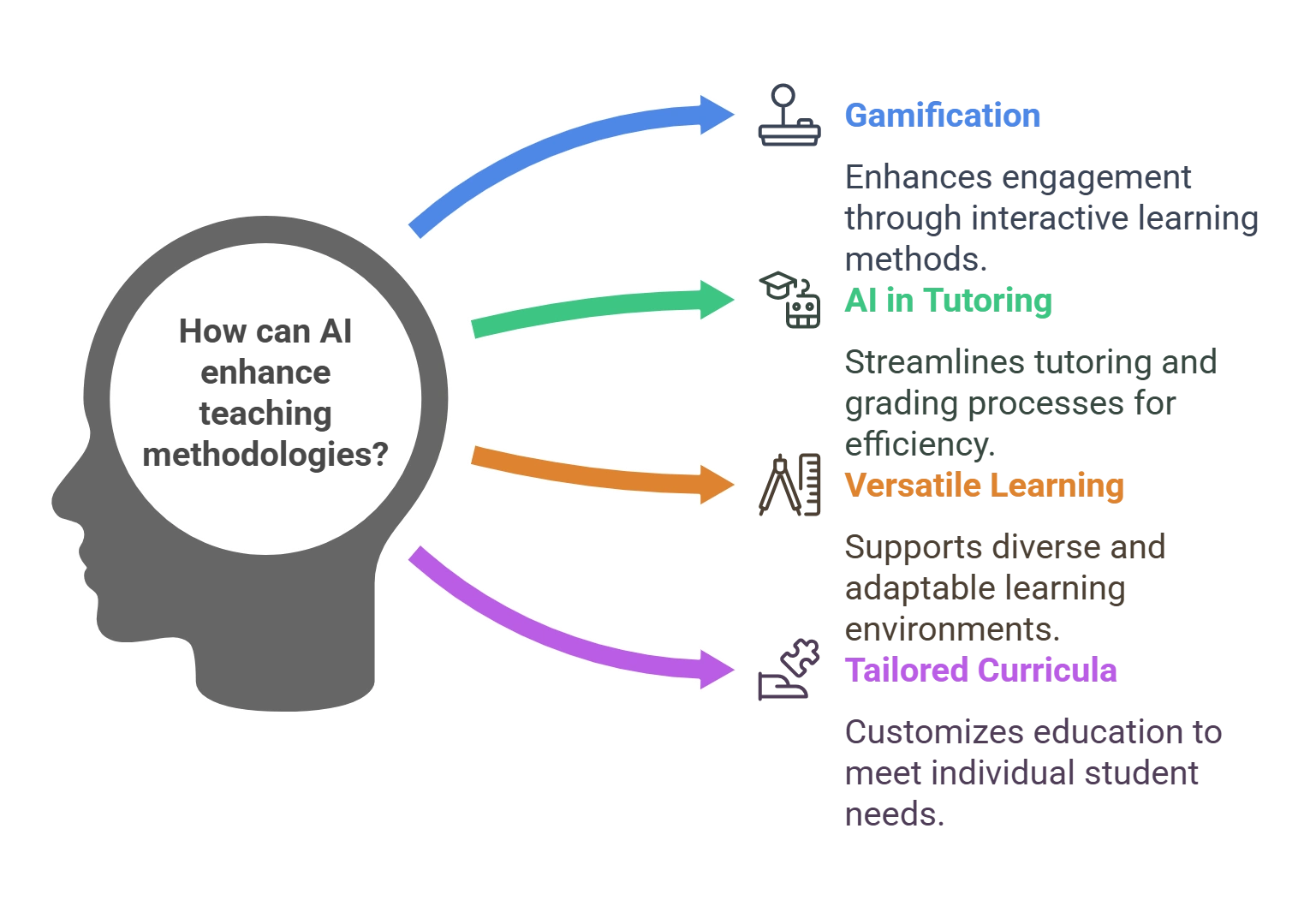
How Can AI Help Explore Innovative Teaching Methodologies?
The global AI industry is undergoing a massive scale-up in education. Teachers are actively expressing their desire to incorporate AI’s functionality and usability into their curriculum design and instruction strategies.
With a CAGR surpassing 10% from 2023 to 2032, the shifting preferences and perceptions regarding the benefits of employing AI are clear. Early childhood education is an all-encompassing facet of teaching and honing crucial developmental skills among children.
Whether it’s teaching the alphabet or critical thinking, all of it serves as a foundation for learning pathways essential for different levels of education.
Teachers often speculate about how to make their teaching methods more compelling and creative so that students can retain concepts better. Today, we have compiled five out-of-the-box creative approaches along with AI to help teachers share greater insights:
1. Gamification- Interactive Learning Methods
One of the most rewarding forms of teaching is the one where learning is more of an experience rather than a method of evaluating students.
Every one of us likes playing games, whether online or offline. Children thrive in experiential environments where games teach reasoning and several analytical skills.
Imagine a game like Takeshi’s Castle for an AI-enhanced learning of the alphabet. The adrenaline-pumping excitement will keep the children on their toes and in anticipation of the next move in the game.
Artificial intelligence can assist you by laying all the groundwork necessary for curating clues and levels of the game. You only need to ensure children turn up and play to their heart’s content.
Apart from curating interesting games, teachers can also employ the strategy to incentivize the learning model in gamified education.
For instance, you can organize scavenger hunts where each letter holds the next clue, and with every step, children unlock levels to proceed ahead in the game. You can prepare leaderboards and award the winners with badges and fun prizes to keep kids engaged and excited about the game.
2. Incorporation of AI in Tutoring and Grading
Teachers are usually weighed down by excessive workloads and assessments wherein you hardly get time to devise creative methods to teach kids. With K5 education, spending time with them and keeping them engaged is much more difficult.
In the formative years of their development, children are easily distracted and get bored fast. You can’t expect them to pay attention to the alphabet if your teaching method is obsolete.
Today’s education landscape is constantly evolving with the influx of AI and other educational technology-enabled tools. It’s time to introduce children to the beauty of AI tutoring, which not only tracks their progress but also suggests innovative methods to teach which is highly specific to the student’s needs and preferences.
For example, you can identify the students struggling with the diction and phonetics of a particular letter with AI monitoring capabilities. They can catch slight inconsistencies and report them. Also, AI in education proves to be a reliable assistant for grading assignments.
All you need to do is add your input of the key parameters and the corresponding score.
3. Open and Versatile Learning Environments
Imagine learning the alphabet in diverse learning environments like the planetarium or the park. Children learn better and faster with visual cues, aids, and props.
You can use videos curated by artificial intelligence to transport the kids to environments of their choice. They can choose the setting and learn in an adaptive, different, yet inclusive preference.
Teachers can adopt such open and flexible learning styles while planning quizzes or assignments so that students have an AI-driven curriculum tailored to their interests. AI can easily help in simulation-based scenarios where the child can learn more than ABC in the environment.
This facilitates creativity in the children’s minds and the capacity to be curious and question during the learning process.
4. Tailored Educational Curricula
Each student has varied strengths and weaknesses. You can help improve their comprehension by using generative AI interfaces.
Depending on the challenges the students face, you can decide which part of language learning, like pronunciation or spelling, requires more focus.
AI will help you prepare lesson plans that cater to students’ individual needs. You can immediately check on their performance and modify the curriculum design.
Similarly, you can assess the success rate of the teaching method through AI’s predictive data analysis. Hence, you can come prepared with an optimized instruction plan and design with the highest success rate.
After all, AI-driven tools can be customized to automate various teaching-style workflows. You will have an AI-enabled assistant at all times.
For instance, Siri and Alexa are the best examples in today’s scenario. They can be trained to work as per your prompts and deliver the best possible solutions to the scenarios.
Imagine such an integration while you’re teaching the alphabet. Won’t it be the ultimate lifesaver for you?
5. Empowering Inclusivity For All Types of Learners
Education is all about welcoming learners with open arms. Students with learning disabilities and challenges are diverse and require special care and attention.
Teachers can use AI to assist them, which will do more than teach. It will support the children through the journey and work with them to improve their ability to understand.
You can program AI-based tools to deliver results efficiently and accurately for special needs students. After you create a profile input of the students’ needs and preferences, you can ask the AI to generate a lesson plan and methods to help the students learn in a thriving environment.
You don’t wish to make them feel different, and that’s where AI steps in.
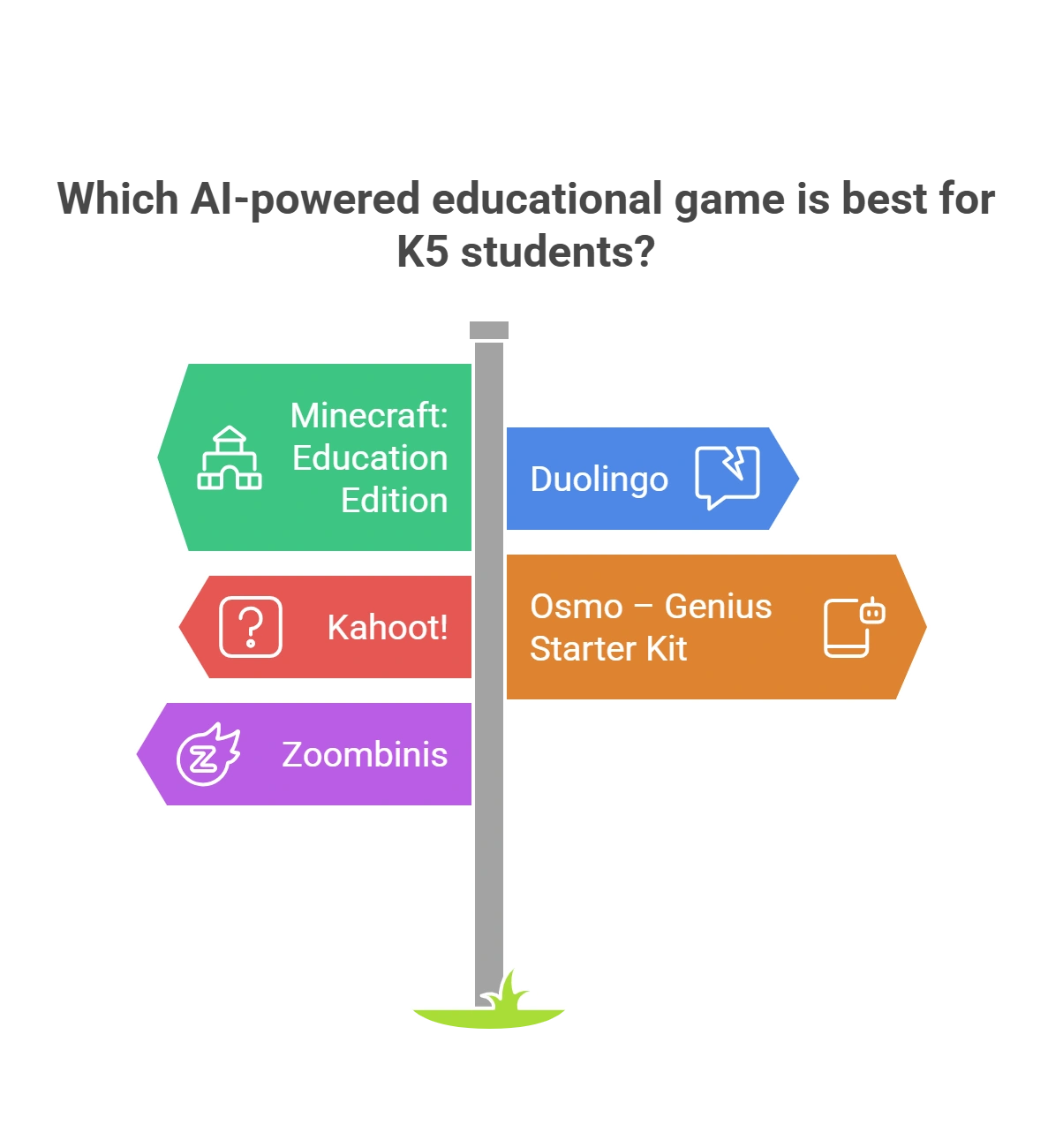
Top 5 AI-Powered Educational Games Your K5 Students
There are a ton of AI games out there, especially for helping K5 students practice and learn math and literacy skills. Out of those hundreds of games, we’ve picked the best ones that will keep the students educated and entertained.
Below are the top AI-powered educational games that are not just fun to play but also provide valuable learning opportunities:
1. Minecraft: Education Edition
Minecraft Education Edition has transformed the popular block-based game Minecraft into a powerful educational tool. From Science to Math to the Roman Colosseum to History, the tool offers 500+ lesson plans to engage students in game-based learning across the curriculum.
Students can explore historical recreations, engage in collaborative building projects, work on problem-solving topics, and experiment or make mistakes during learning.
- Highly engaging platform with tons of K5 learning activities across subjects.
- Personalized games that are adaptable to any subject area. Excellent accessibility features for all learners.
- Great teaching tools with tutorials and features to support educators.
- Available for iPad, Mac, Windows, and Chromebook.
2. Duolingo
Duolingo is a widely used language-learning app that offers creative and free courses for K5 students. With delightful stories and innovative phonics lessons, the tool helps students learn listening, writing, reading, and speaking skills. As students complete bite-sized lessons, they earn points and unlock new levels, making learning fun and effective.
- Research-backed teaching methods that help students acquire real-world communication skills.
- Employs game-like features and fun challenges to keep students motivated and develop a language learning habit.
- Available on the App Store and Google Play.
- From English tests to fun Math lessons, the tool offers personalized learning to help students learn at the right pace and level.
Price: Accessing lessons on Duolingo is completely free.
3. Kahoot!
Kahoot! is an interactive platform that allows educators to create and share engaging and educational quiz-style games. The platform also offers 100+ million ready-to-play games for learners of all ages, including K5 students.
The AI algorithms behind this platform continuously analyze student performance, adapting the difficulty of questions to meet each student’s unique needs.
- It fosters a competitive and collaborative learning environment, promoting teamwork and active participation in the classroom.
- Teachers have access to visual reports with valuable insights into class progress.
- Educators can share games and student-paced challenges directly to Google Classroom, Microsoft Teams, Apple Schoolwork, and Remind.
Price: Kahoot! EDU Standard School & District plan starts at $12.49 per teacher per month.
4. Osmo – Genius Starter Kit
The Osmo Genius Starter Kit brings AI-powered educational games to life by merging physical and digital interactions. Designed for children aged 5 to 12, Osmo includes various games that cover subjects like math, drawing, spelling, and problem-solving.
- The game uses AI to track and respond to a student’s actions and movements in real-time.
- The kit includes everything your students require for a hands-on learning experience. They can experience digital fun in 5 different ways- Tangram pieces, Osmo Base for Fire or iPad, Numbers Tiles, Stackable Storage, and Words Tiles.
- Available on iPhone and iPad.
Price: $99 per unit.
5. Zoombinis
Zoombinis is a puzzle-based game that combines critical thinking, logic, and math skills to solve challenges. The game has won numerous awards for its educational value and is particularly suitable for K5 students.
The platform fosters experimentation and creative thinking, making it an excellent choice for cultivating necessary problem-solving skills in young learners.
- Zoombinis offers 12 math-based logic puzzles, each featuring four progressively challenging levels.
- It cultivates powerful thinking skills, decision-making, and resilience through immensely enjoyable gameplay that keeps students returning for more.
- The AI algorithms behind Zoombinis adjust the complexities of the puzzles as the student progresses, making for a cognitively powerful playtime.
Price: Available for download on the App Store at $2.99.
Wrapping Up
The AI curriculum for K5 students should be engaging, age-appropriate, and hands-on. This is important to help students comprehend AI’s fundamentals and societal impact.
Educators, parents, and society are responsible for empowering the next generation with the knowledge and skills they need to navigate and shape the AI-driven world. However, transforming the curriculum is a significant task that often demands valuable time and resources.
The good news is that you can seek the services of digital curriculum providers to develop the perfect AI curriculum. With access to 4000+ digital learning objects, Hurix Digital is one of the best curriculum providers that can help transform your educational experience.
We specialize in tailoring learning solutions for elementary to high school students, offering an array of engaging tools, including multilingual multimedia-rich content, game-based learning, and simulation-based learning.
Connect with us today to expedite your AI curriculum development process!

Senior Vice President – Business Development
Over 25 years of experience in the edtech and workforce learning industry with strong skills in Business Development, Customer Relationship Management (CRM) and Strategy.

